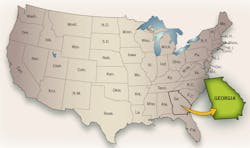Georgia's dental desert
A lack of access to care renders lush Georgia into a barren place for patients
by Suzanne Newkirk, RDH, and Lynne Slim, RDH, MSDH
Looking at the lush greenery of the Georgia mountains or the enticing beaches and barrier islands along the Georgia coast, tourists wouldn't describe Georgia as a desert, but the thousands of Georgians who lack dental insurance or funds for basic preventive dental care know otherwise.
The U.S. Department of Health and Human Services (HHS) defines a dental desert as a dental Health Professional Shortage Area (HPSA). As of 2011, 49 million Americans were living in dental deserts. According to HHS, it would take nearly 10,000 additional dental practitioners to meet the current needs of these Americans.
Georgia is the largest and fastest growing state east of the Mississippi. With just one dental school in Augusta, and only 4.4 dentists per 10,000 people, the state ranks 49th among states for dentists per capita. This means that too many people in Georgia don't have access to dental care.
Consider reading: How the master's degree opens doors
Consider reading:Is dentistry still a viable career choice?
Consider reading:Job benefits for dental hygienists: Part 2
Regrettably, the Georgia Dental Association (GDA) denies there is a shortage of dentists in the state, even though uninsured and low-income Georgians seek care at Grady Memorial Hospital's Emergency Department, averaging between 70 and 105 dental emergencies per week and costing taxpayers millions of dollars. In 2009, the 60,000 emergency dental visits cost taxpayers $25 million. Sadly, dental care provided in an emergency room is prohibitively expensive, inefficient, and generally doesn't solve dental problems – problems that are preventable.
Dental caries remains the single most common, chronic disease of childhood. When left untreated, dental caries (commonly referred to as "cavities") results in pain, infection, distraction from learning, and missed school days, and may inhibit general growth and development because of the associated nutritional liabilities. Severe abscesses, caused by untreated decay, frequently send many low-income Georgians to an emergency room.
It has been reported that some dental infections can travel from decayed teeth to the brain and, if untreated, can result in death. In 2007, 12-year-old Deamonte Driver died from an infected tooth. By the time Deamonte's aching tooth received attention, the bacteria from the abscess had spread to his brain, and after two operations and more than six weeks of hospital care, Deamonte died.
In August 2011, 24-year-old Kyle Willis also died from a tooth abscess because he couldn't afford to pay the $27 cost of antibiotics. Willis, who was an unemployed and uninsured single father, sought emergency room treatment when his face began to swell and his head started to ache. He was given prescriptions for both antibiotics and pain medication, but because he couldn't afford the cost of the antibiotics, he paid the $3 for the pain medication. The infection spread, causing his brain to swell. He died, leaving behind his six-year-old daughter.
Periodontal disease is primarily a disease of adulthood, typically established during adolescence and continuing throughout life. It is the single most common cause of adult tooth loss. Low-income Georgians know only too well the impact that these untreated diseases have on one's overall health, speech, appearance, and self-esteem.
Lack of access to dental care has become a national crisis. In February 2012, Senator Bernie Sanders, chairman of the Senate Subcommittee on Primary Health and Aging, held a congressional hearing to address the dental crisis in America. In his report, Senator Sanders cited potential solutions to increase dental access by expanding the number of oral health providers to treat low-income individuals and other populations that face barriers to care.
To date, 35 states allow dental hygienists to provide care directly to patients; 15 permit state Medicaid department direct reimbursement to dental hygiene providers. Forty-four states allow general supervision, meaning dental hygienists provide care without dentists' direct supervision.
Throughout the nation, state policymakers, consumer advocates, and oral health coalitions are pioneering innovations to extend the reach of oral health care delivery to the underserved. Because oral diseases are mostly preventable, many states are expanding dental hygiene practice acts to allow hygienists to provide services in nontraditional dental settings, such as clinics, nursing homes, hospitals, and facilities that treat people with developmental disabilities – except for Georgia.
Georgia's past public health director, Dr. Rony Francois, said that Georgia's current rules governing hygienists "are among the most stringent in the nation.'' This is bad news for low-income adults because there are no viable government programs for them. Unless low-income adults are incarcerated or are lucky enough to find a dentist who accepts Medicaid for an emergency visit only, they are out of luck when it comes to dental care.
In January 2010, the Georgia Dental Association voted to establish the Georgia Mission of Mercy (GMOM), a two-day dental clinic to provide free access to dental care for about 2,000 adults unable to pay for treatment. This Herculean effort took 15 months of planning and was comprised of 1,400 volunteers, which included 300 dentists and 150 hygienists.
In August 2011, the GMOM took place with the first patient in line arriving 17 hours early. By early morning, approximately 4,000 people created a line 2,000 yards long. The two-day event provided $1.7 million in free dental care to 2,179 Georgians suffering from oral disease and pain. Along with providing dental care, the project's goal was to educate patients and family members about the importance of dental hygiene.
For the working poor, uninsured, and aged, Georgia's Mission of Mercy is too little too late. As we all know, one two-day event in Atlanta once a year is no substitute for regular, periodic, and preventive care. While the GDA professes the importance of dental hygiene education, they fiercely restrict access to dental hygienists, which makes one wonder whose interests are served by GDA's stranglehold on access to dental care.
In April 2011, an Institute of Medicine (IOM) report called on the U.S. government to explore an expanded role for nondentists and new ways of paying for dentistry, in order to address the dental crisis. It is estimated that by 2014, under the Affordable Care Act, 5.3 million more children will be entitled to dental benefits from Medicaid and the Children's Health Insurance Program. Unfortunately, Georgia Governor Nathan Deal said that he would not expand the Medicaid program under the federal Affordable Care Act even though the federal government promised to pay 100% of the cost for the first three years and 90% thereafter.
Expanding the state-based health insurance program for poor Georgians in 2014 would have provided health coverage for approximately 650,000 low-income people. According to the 2011 U.S. Census Bureau, Georgia ranks as the sixth-highest state for poverty in the U.S. About 20% of Georgians do not have health insurance, making Georgia one of the leaders in states with the most uninsured residents.
In July 2012, dental providers, researchers, legislative leaders, and health professionals gathered at a regional oral health conference in Atlanta, sponsored by Morehouse School of Medicine, to focus on Georgia's dental deficits and explore opportunities to improve access to oral health care. Dr. David Satcher, former U.S. Surgeon General, and Dr. Louis W. Sullivan, former U.S. Secretary of Health and Human Services, spoke at the conference and expressed support for dental therapists to provide care for those in underserved communities.
Proposals to license midlevel dental providers have stirred controversy across the United States since the inception of the Alaska Dental Health Aide Therapist (DHAT), founded in 2005 to reduce the oral health inequities affecting many Native American children.
In 2009, Minnesota approved legislation for the first U.S. dental therapy program, and in 2011, the first class of dental therapists graduated from the University of Minnesota School of Dentistry. Although Minnesota is currently the only state to license dental therapists, 20 states are actively exploring this innovative approach to expanding oral health care.
The American Dental Association (ADA) and their state dental associations vehemently oppose the creation of midlevel dental providers as a solution to care, denying there is a shortage of dentists, stating, "The situation is entirely a matter of geographic misdistribution," and consistently maintaining that dental therapists are not adequately trained to perform irreversible procedures.
However, a recent report on 26 nations' and territories' experiences with midlevel dental providers found that they provide good quality, cost-effective care, and according to the January 2013 issue of the Journal of the American Dental Association, dental therapists were found to treat caries as effectively as dentists.
In election years, special interest lobbyists get a chance to be major political players; in 2008, the American Dental Association PAC gave more than $2 million to federal candidates and parties for that year's election. For the 2010 races, the ADA's chapters gave nearly $13 million to state and local politicians, according to the National Institute on Money in State Politics, a nonpartisan research group.
In 2012, the ADA and its 157,000 members doled out millions in federal and state contributions, making it a heavy hitter on the Washington political scene. Donation dollar accomplishments include effectively opposing 2013 federal funding for "Alternative Dental Health Care Provider Demonstration Projects," meaning dental therapists. Because dentists are major campaign contributors in local and state elections, they usually win the legislative battles, but it's the general public that loses out in the long run.
There are 4,044 practicing dentists in Georgia, compared to 6,808 licensed dental hygienists; many of whom are unemployed due to an oversaturated market. Georgia currently has 16 entry-level dental hygiene programs actively enrolling students who graduate only to find limited or no job availability. If they do find work, sometimes it's part-time, hourly employment -- without benefits.
The culture of dental hygiene education programs in Georgia is misleading because the dental hygiene job market is shrinking when it could be growing. Georgia's restrictive practice acts make it illegal for dental hygienists to provide dental hygiene services to the public without the direct supervision of a dentist, thus making dental care for low-income adults even more cost-prohibitive.
Throughout the nation, many states are expanding practice acts for dental hygienists, putting licensed oral health-care professionals to work and increasing access to care for low-income individuals while improving oral health.
In 2009, Massachusetts adopted the Public Health Dental Hygienist Program, which began operating in 2011 as a demonstration project through a grant from the University of Massachusetts Medical School. The hygienists, who are authorized to be "directly reimbursed for services administered in a public health setting," began working in schools, nursing homes, Head Start programs, and residences of the homebound, providing preventive dental care to both children and adults and also acting as an important bridge for continuing care by referring patients to dentists for ongoing services.
During its first full year in 2011, the program served approximately 2,700 Massachusetts residents. In 2012, the number of people who received care topped 6,900 – an increase of 155%. A combined, consistent effort is urgently needed in Georgia to improve oral health care. If policymakers in Georgia were to adopt legislation similar to that of Massachusetts, Georgia's licensed dental hygienists could increase access to care for low-income patients and help lower the cost of preventable emergency dental visits, thus saving the state's taxpayers millions of dollars while expanding employment for an existing workforce of licensed professionals.
Although the Georgia Dental Association asserts there is no lack of dentists in the state and continue to restrict hygienists' ability to assist thousands of low-income individuals, eventually consumer advocates and oral health coalitions will force Georgia's policymakers to make changes for the good of the public. Until then, the dental forecast for Georgia is expected to stay hot and dry. RDH
Suzanne Newkirk, RDH, graduated from the University of Alaska Anchorage in 1981 and has dedicated the last 31 years to excellence in clinical dental hygiene and periodontics. Suzanne is a periodontal therapist, dental hygiene coach and mentor, Perioscopy instructor, and national speaker. Ms. Newkirk is a member of the American Dental Hygienists' Association and Georgia State Dental Hygienists' Association and moderates the Perioscopy Users Forum on LinkedIn. For more information, visit www.perioscopyprofessionals.com.
Lynne Slim, RDH, MSDH, is the Periodontal Therapy columnist for RDH magazine and an award-winning dental author who has published extensively in dental and dental hygiene journals, including Dental Economics. In 2003, Lynne founded Perio C Dent, a dental practice management company that specializes in the incorporation of nonsurgical periodontal therapy into the hygiene department of the general dental practice. Lynne coaches dental hygienists and dentists in ultrasonic instrumentation and other advanced hygiene initiatives. Lynne is also the owner and moderator of the periotherapist Yahoo group: www.yahoogroups.com/group/periotherapist.
Past RDH Issues


